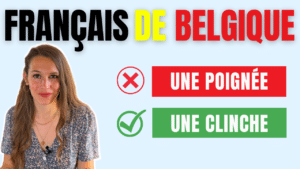Transcript of the video
Today, I'm wearing a wool sweater dress with a belt and earrings. Rest assured, you're not in a fashion youtube video, but you are in a video for learning French.
In this video, we'll take a look at the vocabulary used to talk about men's and women's clothing, as well as accessories and patterns. As always, don't forget to download the vocabulary card to review the vocabulary in this video.
It's available for free in the description. Before I start this video, I'd like to take a few seconds to tell you about my Black Friday offer.
Until November 29, when you take my online course 50 dialogues from everyday life to boost your French comprehension, you'll save 30% and, what's more, I'll send you my French notebook. A notebook to work on your French every day for 90 days.
Just enter the code Black Friday when you place your order. I'd like to remind you that my online course gives you access for life. Don't hesitate to find out more about it, to see if it's right for you, by clicking on the link in the description.
Now, I hope you're ready to talk clothes. As I was saying, I'm wearing a dress. The material is wool. It's what you find on sheep. You can also wear a skirt. Here, we'll even say a long skirt. If you wear a shorter skirt like this, it's called a miniskirt.
Here I have another skirt and you can see the material, it's leather. Leather is a material that comes from animals. Pants. And you see, the material is denim. So you can call them simply pants or jeans. Here, for example, you see, I have another pair of pants, but they're not jeans.
So they'll just tell me pants. A sweater. You can also have sweaters with a collar that goes up. We'll call it a turtleneck. You can either say a turtleneck sweater, or just a turtleneck.
Here, it's a garment usually worn under another sweater. We'll call it an undershirt. You put it under a sweater for extra warmth. I also have t-shirts in my wardrobe.
Here, you see, it's a t-shirt. By the way, it needs ironing. When you iron a garment, you use an iron to make it flatter, to remove wrinkles. I also have sweaters in my wardrobe.
A sweater, you see, is a sweater in this material that you're going to wear more for sports or for casual dressing. When you have a casual style of dress.
Casual is the opposite of formal. I showed you earlier about myself, but in my wardrobe, I have lots of belts, belts. You can put them on like I do at the waist to cinch a garment. Here, I have other clothes, you see. I've got a vest.
A cardigan is like a sweater, but you have buttons or you can have a zipper to close it. It's open. Here, it's a shirt.
A shirt. Yes, it's also very wrinkled. I need to iron it. Ironing's not really my forte. This is called an overshirt.
An overshirt is a garment worn over a shirt that's a little thicker. This overshirt, you see, has a check pattern.
Checkered. These are squares. For a garment, let's say it's a plaid shirt. Here, I have a dress. You could say it's a floral dress, because there are floral motifs, so with little flowers.
A floral dress. Here, it's a different material. It's a sequined dress. It's a complicated word. Sequins. You see, they're these little round shapes. They're sequins.
It's a sequin dress. So here, I don't know if you can see well because it's a bit tone-on-tone, but it's a polka-dot dress. For example, you could also have a white dress with blue polka dots or red polka dots. Here, it's black on black. The polka dots are velvet.
It's a polka-dot dress with velvet. You see, when you run your hand over it, it's very soft. On patterns, on prints, you can also have stripes.
Here, it's a striped sweater. We're going to show some boys' clothes too. We have a polo shirt. A polo shirt. Here we have a suit jacket. A suit jacket. Under a suit jacket, we usually wear suit pants.
When you put on a suit, you can also put a tie on your shirt.
A tie. If you prefer, you can also wear a bow tie. A bow tie. I'm showing it here because Mathieu doesn't have one. We have what's called a chino.
A chino. You see, they're fairly light pants. This one's linen, isn't it, Mathieu? Linen is a material we wear a lot in summer.
A tracksuit. So, sweatpants for sports. Here we also have shorts. Here, it's a pair of sports shorts, but you use the same word for this form of clothing, whether it's for sports or for going to the beach, walking around town...
Earlier, I told you about sweaters. This is a hoodie. More and more French people are also calling it a "hoodie", but it's mostly young people. Otherwise, we call it a hoodie, because you can put the hood over your head.
Here we have jerseys. Here we have a jersey too, but you could also call it a short jersey. A short jersey.
And then, for girls, we also say a swimsuit, but you can specify whether it's a one-piece swimsuit, like this one, or a two-piece, two-piece swimsuit.
Generally speaking, two-piece swimsuits are called bikinis. You see, here, I'm wearing tights. Tights. That's what you usually wear in winter with a dress or skirt.
You can also put socks in your shoes. Here, I've got some lovely ones with little dogs on them. Underwear includes panties for women and briefs for men. Women's underwear also includes bras, which are worn around the breasts. Accessories include glasses.
Here, we're talking about prescription glasses, but sunglasses can also be worn when the sun is out. Let's move on to jewelry. Jewelry is earrings, earrings, rings, rings.
And here, you see, is a special ring called a wedding band. A wedding ring is a ring when you get married. I have a watch. Here we have bracelets. Bracelets. Around your neck, you can also wear a necklace. A necklace.
I'll now take you to our coat rack to show you the different things you can find.
Here, you see, we have a coat. Quite simply, a coat. Generally speaking, the difference between a coat and a jacket is that a coat is much warmer and thicker.
A jacket, it's going to be, for example, this. This denim jacket. Here, you see, it's a jacket, not a coat. It's lighter. We have what we call a blazer.
It's a light jacket that can be worn in spring or autumn. We have a raincoat or rainwear.
Very often, in French, we use the name of a brand to talk about this type of jacket, we'll say un K-way, because it's such a well-known brand, which represents so much rainwear, that we very often say un K-way, even if yours isn't from the K-way brand.
It's become a bit of a generic word. So now, while we're here, maybe we can move on to accessories. Here, it's a hat. A bonnet.
You can also put a cap on your head. A cap. You can also put a hat on your head. A hat. Here, I also have a bag or a handbag. A handbag. You can also have a backpack, which you put on your back.
In winter, when you're cold, you can wear a hat, but you can also wear a scarf. Again in winter, you can wear gloves to protect your hands from the cold. There are also mittens, where you only have two compartments, one that covers the four fingers and one for the thumb. You're a bit like that.
Let's move on to a few shoe models.
Here you have baskets, sneakers. I know it may sound strange to an English speaker because it doesn't mean the same thing at all, but in French, we use the word basket both for sport and for shoes you can wear to play sport or, increasingly, to go for a walk... You have boots, bottes. Here, it's booties, booties.
They're little boots. Here, you see, Mathieu also has boots. These are men's boots. It's the same principle, they're more winter shoes. I have sandals, sandals.
And we can specify flat sandals, flat sandals, as opposed to, of course, heeled sandals, heeled sandals or heeled shoes.
That's it for my dressing room tour, and Mathieu's too for that matter. I hope you enjoyed it, and that you were able to learn some new vocabulary or revise words you already knew. And don't forget that you can download the worksheet to review all these words.
Feel free to comment on any other words for clothes, accessories or patterns that you know in French.
And don't forget that for one week, you'll have access to a special Black Friday offer where you'll get both a 30% discount on my online course and this notebook sent to your home, at least for the first 20 registrants. See you soon.
Put a "j'aime" on the video if you like it, and don't forget to subscribe so you don't miss any of my French videos.
Have a nice day.







